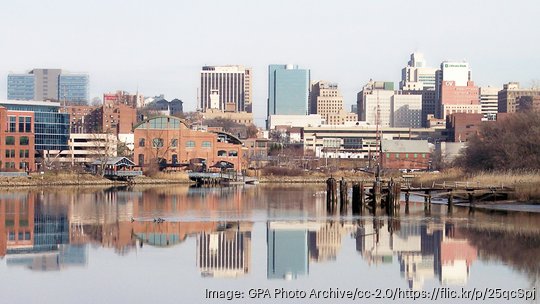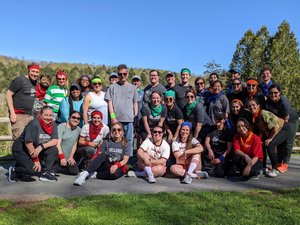
An Alabama-based startup accelerator is readying to launch in Delaware as part of its mission to develop founders from underrepresented populations in areas where there is a dearth of capital.
Nonprofit venture fund Bronze Valley, in partnership with nationwide accelerator platform gener8tor, will launch with two accelerators in the First State this June. The organizations are currently accepting applications for the 12-week cohorts known as the gBETA and the gALPHA programs.
Bronze Valley's gBETA program is a non-equity, pre-accelerator geared toward established companies led by women and/or individuals identifying as Black, indigenous or people of color. It provides mentorship, resources for go-to-market strategies and investor introductions through three months of gener8tor programming.
The gALPHA program is also a non-equity program, but unlike gBETA it is geared toward entrepreneurial students at historically Black colleges and universities. For the gALPHA program, Bronze Valley is partnering with Delaware State University, a public HBCU founded in 1891. The hope is that Bronze Valley's local HBCU partnerships will expand eventually. Cheyney University, for example, sits just across the state border in Delaware County.
Bronze Valley plans to launch two cohorts of each program in 2023, with the first slated for June 8. In time, the goal is to bring its Bronze Valley Investment Accelerator to Delaware. That program invests $100,000 in five startups and is already up and running in Alabama. Bronze Valley CEONeill Wright, who grew up in Montgomery County, hopes that "priming the pump" with the other programs first will then allow them to launch the venture funding aspect in about a year.
"What we’ve found in Delaware, and even in the Philadelphia area, [is that] the capital is not as prolific as some other markets and capital for diverse founders is less prolific," Wright said. "Here we think lies the opportunity, especially leveraging the proximity to the eds and meds in Philadelphia, [plus] ChristianaCare and Delaware State University in Delaware. It's fertile ground that we can play a small role in developing the ecosystem."
In Delaware in 2022, just three venture deals closed from two investors. Two were under $1 million, according to recent data from PitchBook. The Greater Philadelphia region, meanwhile, has become an active region for venture capital deals, but the total dollar amount hasn't stacked up as well to other large metro areas like Boston or Silicon Valley. The approximately $700 million in venture capital raised in the region during the first quarter was tied for seventh with Seattle among 10 regions analyzed by PitchBook.
The larger issue is that only a small fraction of venture capital dollars nationally goes to startups founded by BIPOC and female entrepreneurs. And that already small fraction has only dropped of late. According to Crunchbase, Black-founded startups saw their market share of venture capital dollars drop from 1.5% in 2021 to 1.1% in 2022. Total funding was more than cut in half, from $5.1 billion to $2.3 billion nationally.
That's a void Bronze Valley and its investment accelerator are looking to fill. The venture fund is categorized as a community development financial institution, or CDFI, so it can leverage government dollars to help accomplish its goal of bolstering the Delaware startup ecosystem and supporting BIPOC and female-founded startups. Wright and Bronze Valley Program Manager Darren Stephenson cited Delaware and Wilmington's resources, including a high density of banks and corporations that could work with startups.

"The goal is to build this program out where it’s more robust, and Delaware is a more prolific [startup] hub. It can be a fintech hub," Stephenson said. "Financially we should have this for startups in the area to get them more opportunities."
Bronze Valley has the support of the state, the City of Wilmington and is also sponsored by Barclays, one of the world's largest banks. State Sen. Darius Brown, a Democrat representing the second district which encompasses about half of Wilmington, said Delaware "has a responsibility to promote partnerships like this one that will help historically disadvantaged entrepreneurs secure the funding they need to grow their businesses."
Up until this point, Bronze Valley has largely focused on startups inthe southeastern U.S., but its two program leaders have deep ties to Philadelphia and Delaware which helped propel its expansion locally. Stephenson, who will run the Delaware accelerator, grew up in the Philadelphia area before attending Morehouse College in Atlanta. He returned to Philadelphia where he worked for Deloitte before pivoting to venture capital. That move took him to Silicon Valley and Redpoint Ventures. Ultimately, though, Stephenson wanted to use his stint in the world's startup hotbed "to make an impact" where he grew up.
Like Stephenson, Bronze Valley's CEO also grew up locally. Raised in Montgomery County, he went on to hold vice president roles at JPMorgan Chase & Co. and Citibank in New York before launching Bronze Valley in Birmingham in 2017.
Bronze Valley has already made investments in five Philadelphia-area companies: EmployeeCycle, PeopleJoy, Stimulus Inc., Grovara and Sweft. All are founded and helmed by people of color.
Startup founders across the country are dealing with uncertain capital markets, the collapse of Silicon Valley Bank and cautious investors. Stephenson said that makes an accelerator like Bronze Valley's, and support for underrepresented founders, all the more pressing.
"The time is now," Stephenson said. "It's the best time with the down market, down rounds. For underrepresented founders, only 2% [of venture capital money] went to female founders [in 2022] and I can only see that decreasing. We have to make an impact. People make great founders no matter the skin color."







